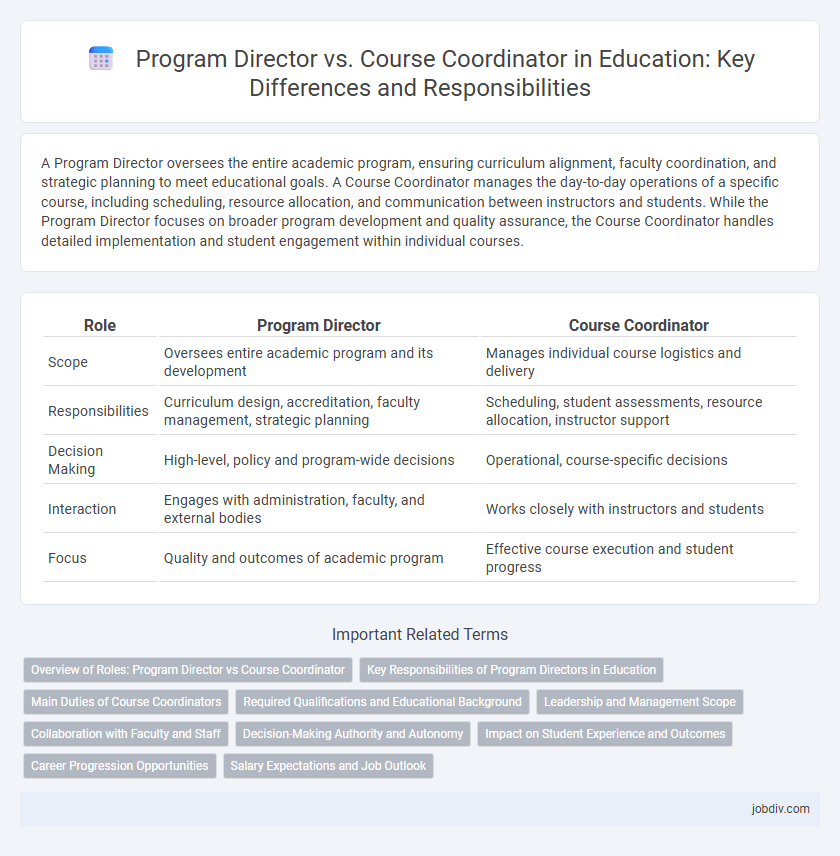A Program Director oversees the entire academic program, ensuring curriculum alignment, faculty coordination, and strategic planning to meet educational goals. A Course Coordinator manages the day-to-day operations of a specific course, including scheduling, resource allocation, and communication between instructors and students. While the Program Director focuses on broader program development and quality assurance, the Course Coordinator handles detailed implementation and student engagement within individual courses.
Table of Comparison
| Role | Program Director | Course Coordinator |
|---|---|---|
| Scope | Oversees entire academic program and its development | Manages individual course logistics and delivery |
| Responsibilities | Curriculum design, accreditation, faculty management, strategic planning | Scheduling, student assessments, resource allocation, instructor support |
| Decision Making | High-level, policy and program-wide decisions | Operational, course-specific decisions |
| Interaction | Engages with administration, faculty, and external bodies | Works closely with instructors and students |
| Focus | Quality and outcomes of academic program | Effective course execution and student progress |
Overview of Roles: Program Director vs Course Coordinator
A Program Director oversees the strategic planning, development, and overall management of an academic program, ensuring curriculum alignment with institutional goals and accreditation standards. A Course Coordinator manages the logistics of individual courses, including scheduling, faculty support, and assessment administration, to deliver seamless course delivery. Both roles are critical in higher education but differ in scope, with the Program Director focusing on program-wide outcomes and the Course Coordinator emphasizing course-specific execution.
Key Responsibilities of Program Directors in Education
Program Directors in education oversee the development, implementation, and evaluation of academic programs to ensure alignment with institutional goals and accreditation standards. They manage faculty recruitment, budgeting, and resource allocation while fostering collaboration among departments to enhance curriculum quality. Program Directors also analyze student performance data and adjust program strategies to improve learning outcomes and maintain program competitiveness.
Main Duties of Course Coordinators
Course Coordinators primarily manage the day-to-day implementation of academic courses, including organizing lectures, scheduling assessments, and liaising between instructors and students. They ensure curriculum consistency, monitor student progress, and handle administrative tasks such as grade collection and attendance tracking. Their role centers on operational efficiency within specific courses, distinct from Program Directors who oversee broader program strategy and development.
Required Qualifications and Educational Background
Program Directors typically require advanced degrees such as a Master's or Doctorate in Education or a related field, along with several years of leadership experience in academic program management. Course Coordinators often need at least a bachelor's degree in education or subject-specific fields and experience in curriculum development or instructional coordination. Both roles demand strong organizational skills, but Program Directors are generally expected to have a deeper background in strategic planning and accreditation processes.
Leadership and Management Scope
Program Directors oversee multiple courses and manage overall academic strategy, faculty coordination, and resource allocation to ensure program quality and compliance with institutional goals. Course Coordinators focus on the day-to-day management of specific courses, including curriculum delivery, assessment scheduling, and instructor support within the framework set by the Program Director. Leadership at the Program Director level involves broad strategic planning and cross-departmental collaboration, while Course Coordinators emphasize operational management and direct interaction with students and teaching staff.
Collaboration with Faculty and Staff
Program Directors manage overall curriculum development and collaborate with faculty to align course objectives with institutional goals, ensuring academic quality and coherence. Course Coordinators work closely with teaching staff to organize course logistics, address student concerns, and facilitate communication between instructors and departments. Effective collaboration between Program Directors and Course Coordinators enhances curriculum delivery and supports faculty performance.
Decision-Making Authority and Autonomy
Program Directors hold higher decision-making authority and greater autonomy, overseeing curriculum design, faculty management, and strategic planning for entire academic programs. Course Coordinators primarily manage day-to-day course operations, implementing Program Directors' guidelines while handling scheduling, assessments, and student support within specific courses. This hierarchy ensures streamlined governance, where Program Directors set educational standards and Course Coordinators maintain operational efficiency.
Impact on Student Experience and Outcomes
Program Directors shape the overall curriculum design and strategic goals, significantly influencing student engagement and learning pathways. Course Coordinators manage day-to-day course delivery and assessment, directly affecting the consistency and quality of instruction students receive. Their combined roles ensure a cohesive educational experience that optimizes student outcomes and satisfaction.
Career Progression Opportunities
Program Directors oversee multiple courses within an academic program, offering strategic leadership and broader administrative responsibilities, which positions them for senior roles such as Dean or Academic Director. Course Coordinators manage individual courses, focusing on curriculum delivery and instructor support, serving as a critical stepping stone for roles like Assistant Program Director or Academic Advisor. Career progression from Course Coordinator to Program Director typically involves gaining experience in program management, leadership skills, and cross-departmental collaboration.
Salary Expectations and Job Outlook
Program Directors in education typically command higher salaries, averaging $75,000 to $100,000 annually, due to their broader responsibilities overseeing multiple courses and faculty members. Course Coordinators generally earn between $45,000 and $65,000, managing specific course content and scheduling. The job outlook for Program Directors shows steady growth driven by increasing demand for educational leadership, while Course Coordinator roles are expected to grow moderately as institutions expand curriculum offerings.
Program Director vs Course Coordinator Infographic

 jobdiv.com
jobdiv.com